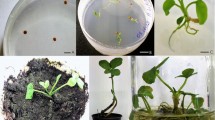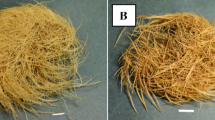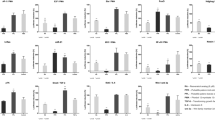Summary
We have investigated the effects of acetone and methanol extracts of a medicinal plant, Terminalia arjuna, on the growth of human normal fibroblasts (WI-38), osteosarcoma (U2OS), and glioblastoma (U251) cells in vitro. We found that both extracts at 30 μg and 60 μg/ml concentrations inhibit the growth of transformed cells; the growth of normal cells was least affected. Although the transformed cells appeared to have fragmented nucleus by Hoechst staining, no deoxyribonucleic acid laddering effect was observed. In response to the extract treatment, the tumor suppressor protein, p53, was induced in U2OS but not in U251 and WI-38 cells. A cyclin-dependent kinase inhibitor, p21WAF1, was induced in transformed cells only. The study suggests that the bark extract of medicinal plant, T. arjuna, has components that can induce growth arrest of transformed cells by p53-dependent and-independent pathways.
Similar content being viewed by others
References
Asai, A.; Miyagi, Y.; Sugiyama, A., et al. Negative effects of wild-type p53 and c-Myc on cellular growth and tumorigenicity of glioma cells. Implication of the tumor suppressor genes for gene therapy. J. Neurooncol. 19:259–268; 1994.
Bai, F.; Matsui, T.; Ohtani-Fujita, N.; Matsukawa, Y.; Ding, Y.; Sakai, T. Promoter activation and following induction of the p21/WAF1 gene by flavone is involved in G1 phase arrest in A549 lung adenocarcinoma cells. FEBS Lett. 437:61–64; 1998.
Bala, S.; Kaur, S.; Grover, I. S.; Sharma, B. Studies on antimutagenicity of methanol extract of Terminalia arjuna in Salmonella typhimurium. J. Plant Sci. Res. 11–12:4–7; 1996.
Bravo, L. Polyphenols: chemistry, dietary sources, metabolism, and nutritional significance. Nutr. Rev. 56:317–333; 1998.
Calixto, J. B.; Santos, A. R.; Cechinel Filho, V.; Yunes, R. A. A review of the plants of the genus Phyllanthus: their chemistry, pharmacology, and therapeutic potential. Med. Res. Rev. 18:225–258; 1998.
Cristofalo, V. J.; Doggett, D. L.; Brooks-Frederich, K. M.; Phillips, P. D. Growth factors as probes of cell aging. Exp. Gerontol. 24:367–374; 1989.
de Mejia, E. G.; Castano-Tostado, E.; Loarca-Pina, G. Antimutagenic effects of natural phenolic compounds in beans. Mutat. Res. 441:1–9; 1999.
Haber, D. A.; Englert, C.; Maheswaran, S. Functional properties of WT1. Med. Pediatr. Oncol. 27:453–455; 1996.
Huang, C.; Ma, W. Y.; Goranson, A.; Dong, Z. Resveratrol suppresses cell transformation and induces apoptosis through a p53-dependent pathway. Carcinogenesis 20:237–242; 1999.
Kandil, F. E.; Nassar, M. L. A tannin anti-cancer promoter from Terminalia arjuna. Phytochemistry 47:1567–1568; 1998.
Kaur, S.; Grover, I. S.; Kumar, S. Antimutagenic potential of ellagic acid isolated from Terminalia arjuna. Indian J. Exp. Biol. 35:478–482; 1997.
Khaoustov, V. I.; Ozer, A.; Smith, J. R.; Noda, A.; Mearns, M.; Krishnan, B.; Slagle, B. L.; Yoffe, B. Induction of senescenct cell-derived inhibitor of DNA synthesis gene, SDII, in hepatoblastoma (HepG2) cells arrested in the G2-phase of the cell cycle by 9-nitrocamptothecin. Lab. Invest. 73:118–127; 1995.
Koganov, M. M.; Dueva, O. V.; Tsorin, B. L. Activities of plant-derived phenols in a fibroblast cell culture model. J. Nat. Prod. 62:481–483; 1999.
Kuzumaki, T.; Kobayashi, T.; Ishikawa, K. Genistein induces p21 (Cip1/WAF1) expression and blocks the G1 to S phase transition in mouse fibroblast and melanoma cells. Biochem. Biophys. Res. Commun. 251:291–295; 1998.
Lang, F. F.; Yung, W. K.; Raju, U.; Libunao, F.; Terry, N. H.; Tofilon, P. J. Enhancement of radiosensitivity of wild-type p53 human glioma cells by adenovirus-mediated delivery of the p53 gene. J. Neurosurg. 89: 125–132; 1998.
Lepley, D. M.; Pelling, J. C. Induction of p21/WAF1 and G1 cell-cycle arrest by the chemopreventive agent apigenin. Mol. Carcinog. 19:74–82; 1997.
Miller, A. L. Botanical influences on cardiovascular disease. Altern. Med. Rev. 3:422–431; 1998.
Mitscher, L. A.; Telikepalli, H.; Wang, P. B.; Kuo, S.; Shankel, D. M.; Stewart, G. Antimutagenicity of secondary metabolites from higher plants. Mutat. Res. 267:229–241; 1992.
Parshad, R.; Sanford, K. K.; Price, F. M.; Steele, V. E.; Tarone, R. E.; Kelloff, G. J.; Boone, C. W. Protective action of plant polyphenols on radiation-induced chromatid breaks in cultured human cells. Anticancer Res. 18:3263–3266; 1998.
Perumal Samy, R.; Ignacimuthu, S.; Sen, A. Screening of 34 Indian medicinal plants for antibacterial properties. J. Ethnopharmacol. 62:173–182; 1998.
Plaumann, B.; Fritsche, M.; Rimpler, H.; Brandner, G.; Hess, R. D. Flavonoids activate wild-type p53. Oncogene 13:1605–1614; 1996.
Author information
Authors and Affiliations
Corresponding author
Rights and permissions
About this article
Cite this article
Nagpal, A., Meena, L.S., Kaur, S. et al. Growth suppression of human transformed cells by treatment with bark extracts from a medicinal plant, Terminalia arjuna . In Vitro Cell.Dev.Biol.-Animal 36, 544–547 (2000). https://doi.org/10.1290/1071-2690(2000)036<0544:GSOHTC>2.0.CO;2
Received:
Accepted:
Issue Date:
DOI: https://doi.org/10.1290/1071-2690(2000)036<0544:GSOHTC>2.0.CO;2




